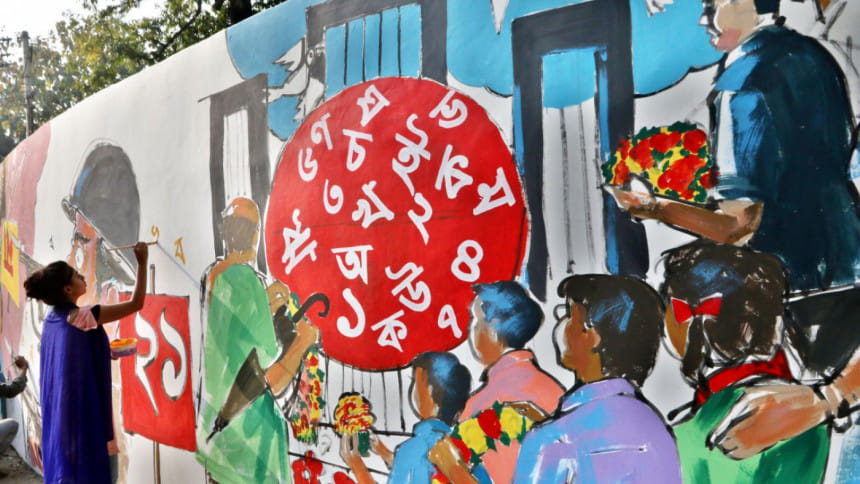Ekushey as a 'Bideshi'

It's the fifth year that I've lived in Bangladesh, and the fifth opportunity to celebrate a day that makes me feel I am a part of something so much greater than myself. I'm an American, and I originally hail from Srinagar, Kashmir. I knew nothing of this land, its customs, societal norms, or much less, of its language when I first set foot on Bangladeshi soil half a decade ago. I came here to pursue medical school, knowing that studying medicine in this subcontinent meant getting to witness unique patient cases and being able to acquire a very sharp clinical eye.
My state during the first few weeks in medical school was the epitome of desperation. I attended lectures in which the PowerPoints were in English, but had professors who spoke in Bangla. I sat there during the initial few months wondering if a "practical medical experience" was truly worth my perpetual confusion. I drowned in self-doubt and disliked the fact that I couldn't be an active part of the society in which I lived. So, I tried really hard to fit in. I'd always been socially awkward in general and disliked putting myself out there, but at the time, I did it because I had to in order to survive in the system. The response from my fellow Bengalis was overwhelmingly welcoming.
I found Bengalis to be so easy to get along with and suddenly began hearing more Bengali than English in this new setting, I caught on to the language pretty easily. I found it easy to pay attention to the way in which people spoke. This included their tone of voice, their gestures, and the select group of words others use to express themselves. I found it easy to mimic these things before I caught on to the actual words of the Bengali language. It wasn't long before I felt comfortable enough to hold conversations in Bangla, only using English as a crutch when I couldn't say what I needed to after a sufficient struggle.
During my adjustment phase, I made a plethora of hilarious speaking mistakes (and still do, from time to time). I once told my hostel room's khala to do black magic on the room, though I'd actually meant to ask her to sweep it up. I said: "Khala, roome jaadu koren" instead of "jharoo daen". During classes, teachers frequently used the phrase: "jai hok", and this reminded me of the Hindi song "Jai Ho" by A. R. Rahman. I was so puzzled as to why my teachers were using this phrase in such a casual, calm manner when the song was known to be upbeat.
In any case, it took me until my third year of college to enjoy a steady handle of the Bengali language. My curriculum was in English, but I had to interact with patients in their own native tongue. As the days passed, this act of speaking Bengali grew to be something very personal to me. Surprisingly, I wasn't ever laughed at for trying to speak it. No matter if I was in class, the market place, or interacting with a patient, no one, no one, in the slightest ridiculed me for my desperate efforts. It was clear that I was trying really hard to be something that I so apparently wasn't. But Bengalis around me took my effort seriously and actually wanted me to master their language. For someone who was halfway across the world and away from the comfort of a home and family, I had very little to hold on to. I often let my anxieties get the best of me, and the journey to get to where I am today necessitated not knowing if what I was doing would ever lead me somewhere.
What I now realise is that learning to speak Bengali served as a portal for my self-growth. The fact that it was an easy language to speak and that it was, further, spoken by warm, welcoming individuals, made me feel like I belonged. I took this feeling of self-belonging that I'd been searching for, and ran with it. I came here when I was 17 years old, and am now 22. I owe so much of who I am today to this country, and the language that made me feel like I belonged.
Medical school ended roughly two months ago. During my final professional exam, I had to speak to my patients in full-fledged Bengali. They complimented me for it and said they'd pray I turn out to be a good doctor. I thanked every single one of them, and my face beamed.
I very recently began an internship with UNHCR Bangladesh. Two days ago while at work, a colleague stopped me and said, in Bengali: "You speak Bengali very well, and I just wanted to say thank you. Thank you for speaking Bengali although you are a foreigner. Bangladesh fought for this right, and it makes me so happy to see a foreigner honouring that". I stood there marvelling at the magnitude of this compliment and could only manage to say: "Dhonnobad".
For having such an admirable and unique movement which showed the world the sacredness of one's mother tongue; I say thank you to you, Bangladesh. My heart swells with pride knowing that a United Nations-declared holiday was inspired by the earnest desire of a people to speak their own language: a language that I myself was so earnest to learn during my initial days here. I see my conviction to learn Bengali comparable to that of Bengalis to speak and preserve Bengali, and this gives me a unique sort of peace.
Ayat Shah is a recent medical school graduate who values creativity, vlogging, and is passionate about mental health.





Comments